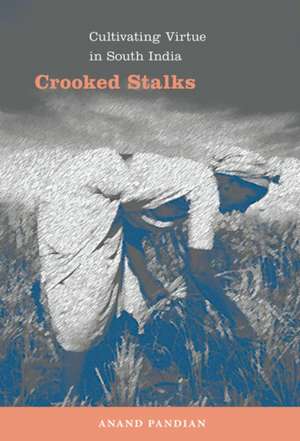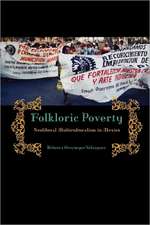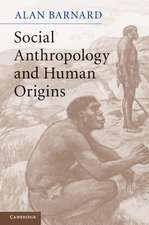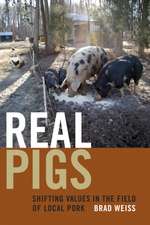Crooked Stalks – Cultivating Virtue in South India
Autor Anand Pandianen Limba Engleză Paperback – 15 oct 2009
Preț: 266.18 lei
Nou
Puncte Express: 399
Preț estimativ în valută:
50.93€ • 53.46$ • 42.28£
50.93€ • 53.46$ • 42.28£
Carte tipărită la comandă
Livrare economică 11-25 aprilie
Preluare comenzi: 021 569.72.76
Specificații
ISBN-13: 9780822345312
ISBN-10: 0822345315
Pagini: 344
Ilustrații: 37 illustrations
Dimensiuni: 159 x 227 x 21 mm
Greutate: 0.5 kg
Editura: MD – Duke University Press
Locul publicării:United States
ISBN-10: 0822345315
Pagini: 344
Ilustrații: 37 illustrations
Dimensiuni: 159 x 227 x 21 mm
Greutate: 0.5 kg
Editura: MD – Duke University Press
Locul publicării:United States
Cuprins
Contents; Acknowledgments; Note on TransliterationIntroduction; 1. A Rough Spade for a Rugged Landscape: On Savage Selves and More Civil Places; 2. What Remains of the Harvest When the Fence Grazes the Crop?: On the Proper Violence of Agrarian Citizenship; 3. The Life of the Thief Leaves the Belly Always Boiling: On the Nature and Restraint of the Criminal Animal; 4. Millets Sown Yield Millets, Evil Sown Yields Evil: On the Moral Returns of Agrarian Toil; 5. Let the Water for the Paddy Also Irrigate the Grass: On the Sympathies of an Aqueous SelfEpilogue; Notes; Glossary; Bibliography; Index
Recenzii
The Kallars of Tamil Nadu were categorized by the British as a criminal tribe in 1918. Anand Pandians study of the Kallars today asks groundbreaking questions about how subaltern groups, caught in the webs of colonial stereotyping and postcolonial projects of development, use these and other resources to produce their own sense of moral life. Crooked Stalks stands out for its caring and creative deployment of historical, ethnographic, and cultural material in tracking the presence of the colonial past in postcolonial times.Dipesh Chakrabarty, author of Provincializing Europe: Postcolonial Thought and Historical DifferenceThe government of British India, in exercising its imperial obsession to count and classify, created a census category called Criminal Tribes & Castes under which it (in)famously included the Kallars of South India, a caste since made famous by monographs by Louis Dumont and Nicholas Dirks. Crooked Stalks is also about the Kallars, but its concerns are contemporary and of wider import. It is a study of the self-making of a community shaped by intersecting vectors of civic governmentality, missionary religiosity, the progressivism of modernity, and Tamil (traditional) virtuosity, with the latter encompassing the words medieval meanings. Crooked Stalks is an original.E. Valentine Daniel, author of Fluid Signs: Being a Person the Tamil Way Anand Pandian brilliantly explicates the complex linkages between the cultivation and care of the self and the cultivation of the land. I have seen no better illustration of the twin meanings of development as an ethical project and a socioeconomic one. This ethnographically thick, historically embedded volume will be a major contribution to a range of disciplines including anthropology, history, geography, sociology, development studies, and subaltern studies.Akhil Gupta, author of Postcolonial Developments: Agriculture in the Making of Modern India
"The Kallars of Tamil Nadu were categorized by the British as a 'criminal tribe' in 1918. Anand Pandian's study of the Kallars today asks groundbreaking questions about how subaltern groups, caught in the webs of colonial stereotyping and postcolonial projects of development, use these and other resources to produce their own sense of moral life. Crooked Stalks stands out for its caring and creative deployment of historical, ethnographic, and cultural material in tracking the presence of the colonial past in postcolonial times."--Dipesh Chakrabarty, author of Provincializing Europe: Postcolonial Thought and Historical Difference "The government of British India, in exercising its imperial obsession to count and classify, created a census category called 'Criminal Tribes & Castes' under which it (in)famously included the Kallars of South India, a caste since made famous by monographs by Louis Dumont and Nicholas Dirks. Crooked Stalks is also about the Kallars, but its concerns are contemporary and of wider import. It is a study of the self-making of a community shaped by intersecting vectors of civic governmentality, missionary religiosity, the progressivism of modernity, and Tamil (traditional) 'virtuosity,' with the latter encompassing the word's medieval meanings. Crooked Stalks is an original."--E. Valentine Daniel, author of Fluid Signs: Being a Person the Tamil Way "Anand Pandian brilliantly explicates the complex linkages between the cultivation and care of the self and the cultivation of the land. I have seen no better illustration of the twin meanings of development as an ethical project and a socioeconomic one. This ethnographically thick, historically embedded volume will be a major contribution to a range of disciplines including anthropology, history, geography, sociology, development studies, and subaltern studies."--Akhil Gupta, author of Postcolonial Developments: Agriculture in the Making of Modern India
"The Kallars of Tamil Nadu were categorized by the British as a 'criminal tribe' in 1918. Anand Pandian's study of the Kallars today asks groundbreaking questions about how subaltern groups, caught in the webs of colonial stereotyping and postcolonial projects of development, use these and other resources to produce their own sense of moral life. Crooked Stalks stands out for its caring and creative deployment of historical, ethnographic, and cultural material in tracking the presence of the colonial past in postcolonial times."--Dipesh Chakrabarty, author of Provincializing Europe: Postcolonial Thought and Historical Difference "The government of British India, in exercising its imperial obsession to count and classify, created a census category called 'Criminal Tribes & Castes' under which it (in)famously included the Kallars of South India, a caste since made famous by monographs by Louis Dumont and Nicholas Dirks. Crooked Stalks is also about the Kallars, but its concerns are contemporary and of wider import. It is a study of the self-making of a community shaped by intersecting vectors of civic governmentality, missionary religiosity, the progressivism of modernity, and Tamil (traditional) 'virtuosity,' with the latter encompassing the word's medieval meanings. Crooked Stalks is an original."--E. Valentine Daniel, author of Fluid Signs: Being a Person the Tamil Way "Anand Pandian brilliantly explicates the complex linkages between the cultivation and care of the self and the cultivation of the land. I have seen no better illustration of the twin meanings of development as an ethical project and a socioeconomic one. This ethnographically thick, historically embedded volume will be a major contribution to a range of disciplines including anthropology, history, geography, sociology, development studies, and subaltern studies."--Akhil Gupta, author of Postcolonial Developments: Agriculture in the Making of Modern India
Notă biografică
Anand Pandian
Textul de pe ultima copertă
"The Government of British India, in exercising its imperial obsession to count and classify, created a census category called 'Criminal Tribes & Castes' under which it (in)famously included the "Kallar "of South India, a caste, since made famous by two monographs, written by Louis Dumont and Nicholas Dirks, respectively. "Crooked Stalks" is also a book about the "Kallar." Its distinction, however, lies in its sparkling difference from its predecessors. Its concerns are contemporary and of a wider import. It is a study of the self-making of a community, historically located at the meeting of four vectorial complexes: civic governmentality, missionary religiosity, progressivism of modernity and Tamil (traditional) 'virtuosity'--the latter encompassing the word's medieval meanings. This is a meticulously documented, convincingly argued, lucidly written work. It is an original."--E. Valentine Daniel, author of "Fluid Signs: Being a Person the Tamil Way "
Descriere
An ethnography on the meaning of virtue amongst the Kallar people of rural southern India, who were considered to be a criminal caste by the British colonizers












